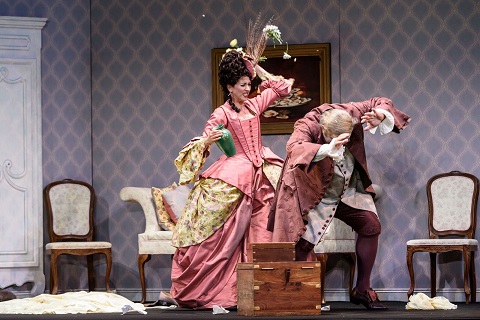
15 Jul 2017
Don Pasquale: a cold-hearted comedy at Glyndebourne
Director Mariame Clément’s Don Pasquale, first seen during the 2011 tour and staged in the house in 2013, treads a fine line between realism and artifice.
English Touring Opera are delighted to announce a season of lyric monodramas to tour nationally from October to December. The season features music for solo singer and piano by Argento, Britten, Tippett and Shostakovich with a bold and inventive approach to making opera during social distancing.
This tenth of ten Live from London concerts was in fact a recorded live performance from California. It was no less enjoyable for that, and it was also uplifting to learn that this wasn’t in fact the ‘last’ LfL event that we will be able to enjoy, courtesy of VOCES8 and their fellow vocal ensembles (more below …).
Ever since Wigmore Hall announced their superb series of autumn concerts, all streamed live and available free of charge, I’d been looking forward to this song recital by Ian Bostridge and Imogen Cooper.
The Sixteen continues its exploration of Henry Purcell’s Welcome Songs for Charles II. As with Robert King’s pioneering Purcell series begun over thirty years ago for Hyperion, Harry Christophers is recording two Welcome Songs per disc.
Although Stile Antico’s programme article for their Live from London recital introduced their selection from the many treasures of the English Renaissance in the context of the theological debates and upheavals of the Tudor and Elizabethan years, their performance was more evocative of private chamber music than of public liturgy.
In February this year, Albanian soprano Ermonela Jaho made a highly lauded debut recital at Wigmore Hall - a concert which both celebrated Opera Rara’s 50th anniversary and honoured the career of the Italian soprano Rosina Storchio (1872-1945), the star of verismo who created the title roles in Leoncavallo’s La bohème and Zazà, Mascagni’s Lodoletta and Puccini’s Madama Butterfly.
Evidently, face masks don’t stifle appreciative “Bravo!”s. And, reducing audience numbers doesn’t lower the volume of such acclamations. For, the audience at Wigmore Hall gave soprano Elizabeth Llewellyn and pianist Simon Lepper a greatly deserved warm reception and hearty response following this lunchtime recital of late-Romantic song.
Collapsology. Or, perhaps we should use the French word ‘Collapsologie’ because this is a transdisciplinary idea pretty much advocated by a series of French theorists - and apparently, mostly French theorists. It in essence focuses on the imminent collapse of modern society and all its layers - a series of escalating crises on a global scale: environmental, economic, geopolitical, governmental; the list is extensive.
For this week’s Live from London vocal recital we moved from the home of VOCES8, St Anne and St Agnes in the City of London, to Kings Place, where The Sixteen - who have been associate artists at the venue for some time - presented a programme of music and words bound together by the theme of ‘reflection’.
'Such is your divine Disposation that both you excellently understand, and royally entertaine the Exercise of Musicke.’
Amongst an avalanche of new Mahler recordings appearing at the moment (Das Lied von der Erde seems to be the most favoured, with three) this 1991 Mahler Second from the 2nd Kassel MahlerFest is one of the more interesting releases.
‘And there was war in heaven: Michael and his angels fought against the dragon; and the dragon fought and his angels, And prevailed not; neither was their place found any more in heaven … that old serpent … Satan, which deceiveth the whole world: he was cast out into the earth, and his angels were cast out with him.’
If there is one myth, it seems believed by some people today, that probably needs shattering it is that post-war recordings or performances of Wagner operas were always of exceptional quality. This 1949 Hamburg Tristan und Isolde is one of those recordings - though quite who is to blame for its many problems takes quite some unearthing.
There was never any doubt that the fifth of the twelve Met Stars Live in Concert broadcasts was going to be a palpably intense and vivid event, as well as a musically stunning and theatrically enervating experience.
‘Love’ was the theme for this Live from London performance by Apollo5. Given the complexity and diversity of that human emotion, and Apollo5’s reputation for versatility and diverse repertoire, ranging from Renaissance choral music to jazz, from contemporary classical works to popular song, it was no surprise that their programme spanned 500 years and several musical styles.
The Academy of St Martin in the Fields have titled their autumn series of eight concerts - which are taking place at 5pm and 7.30pm on two Saturdays each month at their home venue in Trafalgar Square, and being filmed for streaming the following Thursday - ‘re:connect’.
The London Symphony Orchestra opened their Autumn 2020 season with a homage to Oliver Knussen, who died at the age of 66 in July 2018. The programme traced a national musical lineage through the twentieth century, from Britten to Knussen, on to Mark-Anthony Turnage, and entwining the LSO and Rattle too.
With the Live from London digital vocal festival entering the second half of the series, the festival’s host, VOCES8, returned to their home at St Annes and St Agnes in the City of London to present a sequence of ‘Choral Dances’ - vocal music inspired by dance, embracing diverse genres from the Renaissance madrigal to swing jazz.
Just a few unison string wriggles from the opening of Mozart’s overture to Le nozze di Figaro are enough to make any opera-lover perch on the edge of their seat, in excited anticipation of the drama in music to come, so there could be no other curtain-raiser for this Gala Concert at the Royal Opera House, the latest instalment from ‘their House’ to ‘our houses’.
"Before the ending of the day, creator of all things, we pray that, with your accustomed mercy, you may watch over us."

Director Mariame Clément’s Don Pasquale, first seen during the 2011 tour and staged in the house in 2013, treads a fine line between realism and artifice.
The opera is fairly light-weight dramatically. Giovanni Ruffini’s libretto is a variation on countless commedia dell’arte and buffe scenarios: a rich old man denies his lovelorn nephew his low-born bride and, falling prey to the scheming machinations of a clever duo of pranksters, exposes his own ridiculous pretensions and unworldliness about the wily ways of womankind. Humiliated and humbled, the aged dupe acknowledges his own foolishness and forgives all: old and young, rich and poor, man and woman are united in harmonious happiness.
Recognising that the leading characters and the make-believe marriage plot can easily slump into caricature, Clément tries to render the protagonists as three-dimensional individuals, but in doing so she sharpens the edge of the comedy to such an extent that, for the first two Acts at least, there’s scarcely a laugh to be had. Don Pasquale - essentially decent despite his all too human flaws - is used and abused by the sinister Dr Malatesta and the shrewish Norina: not so much taught a lesson as tossed pitilessly into a pit of abjection.
I’m not convinced that Don Pasquale deserves such cruelty. We first meet him, in nightcap and grubby shirt, slumped on a chaise longue beneath a memento mori painting, waiting for Doctor to cure his aches and pains. Yes, he is - as Norina bluntly states - old, fat, lecherous and parsimonious, but he’s not really doing anything ‘wrong’, at least by the mores of his day, in seeking to protect his family line and wealth through a profitable marriage for his nephew.
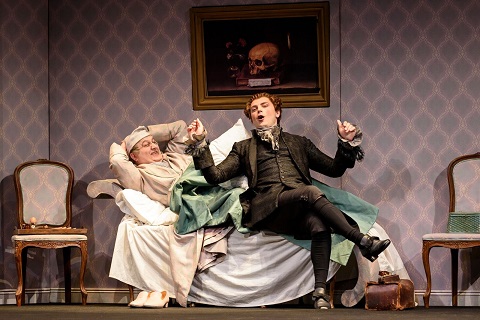 Don Pasquale (Renato Girolami) and Dr Malatesta (Andrey Zhilikhovsky) Photo credit: Bill Cooper.
Don Pasquale (Renato Girolami) and Dr Malatesta (Andrey Zhilikhovsky) Photo credit: Bill Cooper.
Moreover, Clemént’s intimations of a relationship between Malatesta and Norina add an uncomfortable tinge. Meeting the young widow in her bedroom to divulge his scheme, the doctor unties Norina’s corset, fondles her neck, and joins her, fully clothed, in her bath of bubbles. Despite the faux foam there’s not much frothiness about the scene.
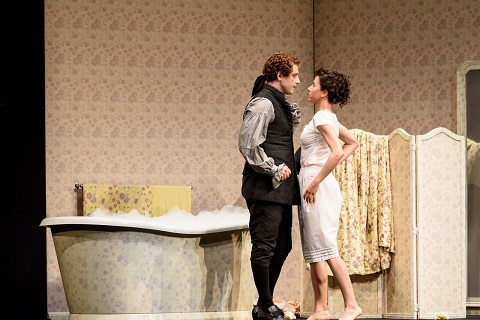 Dr Malatesta (Andrey Zhilikhovsky) and Norina (Lisette Oropesa) Photo credit: Bill Cooper.
Dr Malatesta (Andrey Zhilikhovsky) and Norina (Lisette Oropesa) Photo credit: Bill Cooper.
In any case, Malatesta may be the ingenious intriguer, but this Norina is indisputably in charge of her own destiny: indeed, we meet her seated at her desk, quill in hand, penning romantic stories, run-throughs for her own amorous fortunes. She relishes her power over the hapless Pasquale and delights in the effortlessness of his undoing; only Malatesta’s intervention stops Norina smashing the flower vase over her new husband’s head, whipped as she is into a crazed excitement by her newfound freedom and dominion. Liberated by her widowhood, flirtatious and flighty, this Norina struggles to sustain her play-acting as the demure, pure ‘nun’ who is offered to Pasquale as a bride.
It’s a weakness of Clément’s conception of the character that there is very little difference between the ‘real’ Norina and the profligate ‘Sofronia’ who unleashes her spite and snappishness on the ill-fated Pasquale. Slapped by his spendthrift bride, Pasquale is utterly humiliated but this Norina shows not the slightest twinge of regret in the face of his vulnerability. However, if Norina does not display a little essential warmth, whatever her vivacity and feistiness there’s a danger that we will lose sympathy with this heartless viper.
Juxtaposed with this harsh realism, though, Clément repeatedly foregrounds theatrical artifice. The set is a circular revolve rimmed with a swishing red curtain which withdraws to reveal Don Pasquale’s slightly down-at-heel house (presumably he’s too mean to pay for redecoration). As the overture plays - lilting lightly in conductor Giacomo Sagripanti’s hands - we spin through the old miser’s rooms and espy Pasquale, his nephew Ernesto and the latter’s beloved Norina asleep in their bedchambers, and occasionally snatch a glimpse of Glyndebourne’s stage-crew speedily redistributing beds, baths and boudoir paraphernalia. It’s a musical ‘Once upon a time’: we’re about to be told a story and there’s no doubting its author: the menacing Malatesta who creeps through bedrooms, sidling through doors, slithering through picture frames, like a Knecht Ruprecht of children’s gothic nightmares. With the concluding accelerando, the revolves spins ever faster and we tumble off the merry-go-round into the first scene.
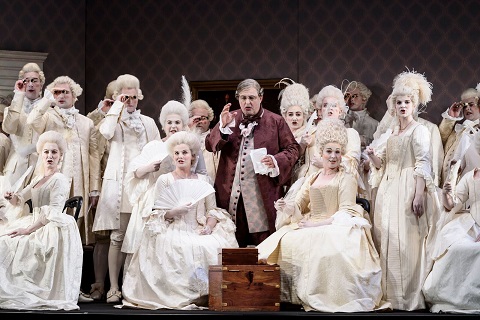 Don Pasquale (Renato Girolami) and The Glyndebourne Chorus Photo credit: Bill Cooper.
Don Pasquale (Renato Girolami) and The Glyndebourne Chorus Photo credit: Bill Cooper.
Clément uses the Chorus - in superb voice here - to sustain the stage-within-a-stage. Just when we’ve forgotten that there is a Chorus, at the end of Act 2 the principal quartet step off the revolve - as Norina, having abandoned her pretence, issues demands and summons Pasquale’s servants to carry them out - and it swivels, bringing into view an ‘audience’ of eighteenth-century ‘idle rich’, head to toe in white, watching Pasquale’s dressing-down with cool amusement. The busy overture to Act 3 brings the aristocrats back as they bustle and elbow their way through the drawn-back curtain aperture - all waggling wigs and fluttering fans - to take their places in Don Pasquale’s room, where the luckless dupe is mourning his lot, amid the mounting piles of bills, invoices, jewels and finery. Forming a formal tableau, the Chorus fling out the cries - ‘The diamonds, the brilliants — here, quick, quick!’ - which belong to the maids and milliners, hairdressers and horsemen who populate the libretto: it’s all rather disorientating.
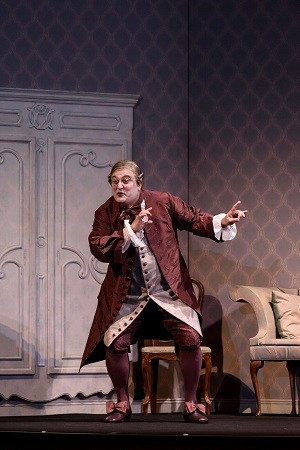 Don Pasquale (Renato Girolami) Photo credit: Bill Cooper.
Don Pasquale (Renato Girolami) Photo credit: Bill Cooper.
But, after two somewhat cold-blooded acts, the final act comes to life, not least due to some fine duets which soften the steeliness of the concept. In fact, there’s much fine singing and acting to enjoy throughout. Renato Girolami’s Pasquale blunders with charm: there’s plenty of ego-massaging and preening but as he clutches a rocking-horse and dreams of a brood of children to fill his empty rooms, it’s hard not to feel that a man who is this naïve at seventy-years-old must truly be in need of a woman’s love. Occasionally Girolami’s bass lacked focus, but he exhibited a range of colour, able to convey the languid self-absorption of the bed-bound Pasquale and, in a flash, to enrich his voice with the old lecher’s fired-up ambition. Moreover, he was good at distinguishing between the asides and self-mutterings and the text exchanged with the other characters.
Girolami made the text work, too, and the rapid-fire articulation in Pasquale’s patter duet with Andrey Zhilikhovsky’s Malatesta was one of the highlights of the evening - the more so for its slick reprise. Zhilikhovsky’s baritone was unforced and focused, even of strength, and he used a resonant legato to shape the bel canto lines effectively. He was a convincingly cunning schemer: no doubt he would make an astute Don Alfonso.
Andrew Stenson’s Ernesto - prone on his bed, reading poetry, surrounded by teddy bears - was less tempestuous poet than petulant toddler, taking his frustration out on his guitar. Stenson has a pleasing tone but lacked the necessary agility; strong through the range, at the top his tenor felt a little tight and the fortes needed more flexibility. He sang his serenade sweetly enough but was rather overpowered in his Act 3 love duet with Lisette Oropesa’s Norina.
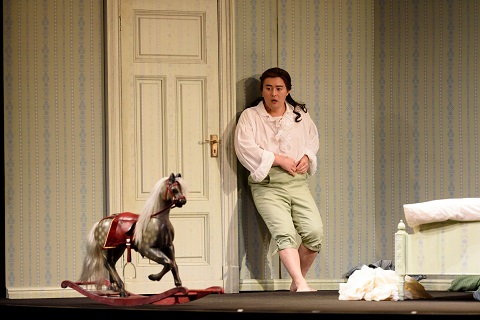 Ernesto (Andrew Stenson) Photo credit: Bill Cooper.
Ernesto (Andrew Stenson) Photo credit: Bill Cooper.
Oropesa doesn’t have a huge voice but it’s a carefully placed one that sits absolutely securely but lightly on the roulades. This was a prima donna performance in every sense, and the foot-stamping accolades Oropesa received were totally deserved. At first there was a slightly hard edge to the tone - perhaps it was intended to reflect Norina’s flintiness - but in her Act 1 duet with Malatesta, and during her raging assault on Pasquale in the final act, Oropesa’s accuracy and ease were notable.
Sagripanti gave his singers plenty of time and space in the arias, though there was some loss of ensemble during the act finales; no doubt the minor blemishes will be erased as the run proceeds. The London Philharmonic Orchestra played sensitively - including a lovely solo cello foretaste of Ernesto’s serenade in the overture and stylish playing from the trumpet in the Act 2 prelude - but also with tautness and incisiveness.
The thing about stereotypes is that in their faults and flaws we recognise our own, and such acknowledgement creates humanity and empathy. They may be caricatures, but we laugh at them and by implication ourselves. Pasquale fulminates and fumes but, ultimately, he forgives. I’m not sure, faced with the wanton cruelty of Clemént’s characters I’d have been so inclined to be generous. Yet, while Donizetti’s music may need to be sung with more of a smile in the voice, the singing on this occasion certainly offered plenty to smile about.
Claire Seymour
Don Pasquale - Renato Girolami, Dr Malatesta - Andrey Zhilikhovsky, Ernesto - Andrew Stenson, Norina - Lisette Oropesa, A Notary - James Newby, Servant - Anna-Marie Sullivan; Director - Mariame Clément, Conductor - Giacomo Sagripanti, Designer - Julia Hansen, Lighting designer - Bernd Purkrabek, Revival lighting designer - Andrew May, London Philharmonic Orchestra, Glyndebourne Chorus (Chorus Master, Jeremy Bines)
Glyndebourne Festival Opera; Thursday 13th July 2017.